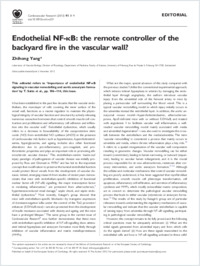Endothelial NF-κB : the remote controller of the backyard fire in the vascular wall?
- Yang, Zhihong Laboratory of Vascular Biology, Division of Physiology, Department of Medicine, Faculty of Science, University of Fribourg, Switzerland
-
02.11.2012
Published in:
- Cardiovascular Research. - 2013, vol. 97, no. 1, p. 8-9
English
It has been established in the past few decades that the vascular endothelium, the monolayer of cells covering the inner surface of the vessel wall, functions as a master regulator to maintain the physiological integrity of vascular function and structure by actively releasing numerous vasoactive hormones that control smooth muscle cell contraction and proliferation and inflammatory cell adhesion and infiltration into the vascular wall.1 Endothelial dysfunction, which usually refers to a decrease in bioavailability of the vasoprotective nitric oxide (NO) from endothelial NO synthase (eNOS) in the presence of cardiovascular risk factors such as hypertension, hypercholesterolaemia, hyperglycaemia, and ageing, includes also other functional alterations due to pro-inflammatory, pro-coagulant, and pro-thrombotic properties and plays an important role in promoting atherosclerotic vascular disease.1 This endothelium-centric ‘inside-out’ injury paradigm of pathogenesis of vascular disease was initially proposed by Ross and Glomset in 1970s2 and has led to the important concept that modification to preserve the luminal endothelial function would protect blood …
- Faculty
- Faculté des sciences et de médecine
- Department
- Département de Médecine
- Language
-
- English
- Classification
- Biological sciences
- License
-
License undefined
- Identifiers
-
- RERO DOC 31942
- DOI 10.1093/cvr/cvs331
- Persistent URL
- https://folia.unifr.ch/unifr/documents/302931
Statistics
Document views: 98
File downloads:
- Document: 138
